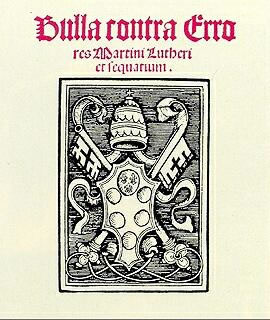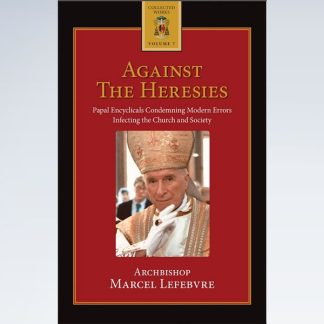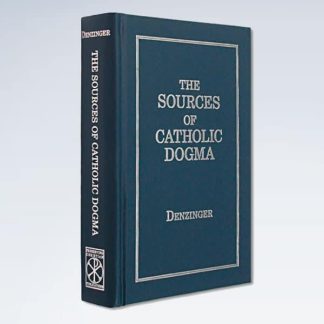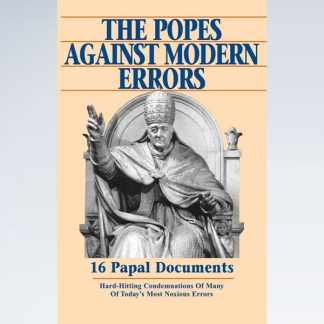

Anti-pope Francis said that Catholics can learn a great deal from Lutherans, in an interview published on Vatican Radio website, as he prepared for a trip to Sweden to join in commemorating the 500th anniversary of the Reformation.
Why would a Catholic celebrate Martin Luther when his entire revolt was based on hatred of the Catholic Faith? Let us see what exactly we can learn from the Lutherans, and from those who condemned Martin Luther’s teachings.
Luther Attacks the Papacy
A central focus of Luther’s 1517 revolt was a full scale attack on the papacy established by Christ. Luther did not object to the policies of this or that Pope, which is something various saints have done. Instead, Luther raves against the Holy See itself in his book Against the Roman Papacy: An Institution of the Devil.
He also denounced the papacy when Pope Leo X condemned his doctrine in the 1520 Bull Exurge Domine. Luther responded:
“I maintain that the author of this Bull is Antichrist: I curse it as a blasphemy against the Son of God… I trust that every person who accepts this Bull will suffer the torments of hell … where are you emperors, kings and princes of the earth that you tolerate the hellish voice of Antichrist? Leo X and you, the Roman Cardinals, I tell you to your faces… renounce your satanic blasphemy against Jesus Christ.”1
Luther went on to burn the Papal Bull and to boast of it the next day:
“Yesterday I burned the devilish work of the Pope, and I wish that it was the Pope, that is, the Papal See that was consumed. If you do not separate from Rome, there is no salvation for your souls.”2
Luther Attacks the Mass
Upon the Holy Sacrifice of the Mass, the most sacred action of the Church, Luther showered vulgar contempt.
He said that no sin of immorality, nay even of “manslaughter, theft, murder and adultery is so harmful as this abomination of the Popish Mass.” He further snarled that he would have “rather kept a bawdy house or been a robber than to have blasphemed and traduced Christ for fifteen years by saying the Masses.”3
In his pamphlet The Abrogation of the Mass, aimed at destroying the Mass, Luther wrote:
“I am convinced that by these three arguments [that he had made previously] every pious conscience will be persuaded that this priest of the Mass and the papacy is nothing but a work of satan, and will be sufficiently warned against imagining that by these priests anything pious or good is effected. All will now know that these sacrificial Masses have been proven injurious to Our Lord’s testament and that therefore nothing in the whole world is to be hated and loathed so much as the hypocritical shows of this priesthood, its Masses, its worship, its piety, its religion. It is better to be a public pander or robber than one of these priests.”4
The great St. John Fisher, who lived at the time of Luther, expressed horror at Luther’s impiety: “My God!” he wrote, “How can one be calm when one hears such blasphemous lies uttered against the mysteries of Christ? How can one without resentment listen to such outrageous insults hurled against God’s priests? Who can read such blasphemies without weeping from sheer grief if he still retains in his heart even the smallest spark of Christian piety?”5
Perversion of Scripture
A key tenet of Luther’s revolution is belief in the “Bible Alone”. In Luther’s system, there is no Church commissioned with Divine authority to teach in Christ’s name, but there is only the Bible as the single source of Divine Revelation. Luther taught this despite the fact that the tenet of “Bible Alone” is nowhere found in the Bible – thus promoting a principle that is non-Biblical.
At the same time, Luther manifested contempt for Scripture by altering texts to fit his own ideas. Luther rejected good works as a means to salvation. He had the audacity to change the 28th verse of Chapter III of St. Paul’s Letter to the Romans to read, “We hold that man is justified without works by the law of faith alone.” Luther added the word ‘alone’ to the sacred text to bolster his own heretical view. To any follower who objected to his perversion of the text, Luther thundered,
“If any Papist annoys you with the word [“alone”] tell him straightway: Dr. Martin Luther will have it so: Papist and ass are one and the same thing.”6
As is obvious, pride was one of Luther’s chief faults. Boasting of the infallibility and superiority of his own teaching, Luther barked,
“Whoever teaches differently than I, though it be an angel from Heaven, let him be anathema.” And further, “I know I am more learned than all the universities….”7
Luther went on to reject various books of the Bible he found unsatisfactory. He denounced the Epistle of James as “an epistle of straw.”
“I do not hold it,” he said, “to be his writings nor can I place it among the capital books.” He rejected the Epistle of James because it proclaims the necessity of good works, contrary to his heresy. Luther also rejected the book of the Apocalypse:
“There are many things objectionable in this book; to my mind it bears upon no marks of an apostolic or prophetic character … Everyone may form his own judgement of this book; as for myself, I feel an aversion to it, and to me this is sufficient reason for rejecting it.”8
Luther would go on to deny the binding force of moral law,
“We must remove the Decalogue out of sight and heart”9
And further,
“If Moses should attempt to intimidate you with his stupid Ten Commandments, tell him right out: ‘Chase yourself to the Jews’.”10
Luther Perverts Morality
Luther, an ordained priest and consecrated Augustinian religious, broke his vow of celibacy and married a nun, also under the vow of celibacy. Luther encouraged many other priests and religious to break their vows and marry.
Luther’s approach was ultimately a surrender to sensuality and worldliness at a time of moral laxity. As Professor Thomas Neil explained, Luther’s appeal to the clergy of his day was successful: “He offered them wives and they wanted wives. He withdrew them from the monasteries and put them in the public square, and they wanted to live in worldly society.”11
The eminent convert David Goldstein wrote: “Luther’s writings regarding matters of sex are the opposite of things decent. Only in Socialist free-love writings have we seen commendation of them. There Luther’s lewd writings have won for him distinction as the ‘classic exponent’ of ‘healthful sensualism’.12 Too many times through the centuries, immoralities have disgraced the Christian ministry, but Luther has the unenviable distinction of having defended sex sins as ‘necessary’.”13
And because Luther taught that man is inherently corrupt, that his sins are never really forgiven but are simply covered by the Blood of Christ provided he make an act of “faith” in Christ’s salvation, he urged his friend Melanchton,
“Be a sinner and sin boldly, but believe more boldly still.”14
How contrary this is to the true Catholic doctrine that commands us not only to avoid sin, but to avoid the occasions of sin.
Luther’s Cruelty
Though Luther made use of the peasants of his time to popularize his revolt, which inadvertently aroused the poor classes to a rebellion that had long been cankering in their hearts, Luther then sided with the princes against the peasants. In a display of his inhuman cruelty, Luther advised the princes that because the peasants
“rob and rave like infuriated dogs … dash them to pieces, strangle them and stab them, just as one is compelled to kill a mad dog.”15
Shattering of Christendom
Father Thomas Scott Preston, in his work The Protestant Reformation, outlines the consequences of Luther’s contention that every man is free to interpret the Scriptures as he sees fit.
“In theory,” writes Father Preston, “private judgment destroys both the creed and the possibility of faith. There can be no creed where each individual is the maker of his own faith. There can be no unity of faith where all matters of belief are referred to the individual judgement. One man is as good as another in finding out his own faith and in interpreting Scripture, or tradition, or history; and more than that, this private judgment is not simply his privilege but his duty. All are bound, even the ignorant and unlettered, to decide for themselves when there is no divine authority and divine witness, and thus you have as many creeds as there are individuals.”16
Even the non-Catholic writer Friedrich Paulsen rightly observed, “Revolution is the term by which the Reformation should be described … Luther’s work was no Reformation, no ‘re-forming’ of the existing Church by means of her own institutions, but the destruction of the old shape, in fact, the fundamental negation of any Church at all.”17
The end result was the ripping away of millions of souls from the one true Church established by Christ, and the shattering of the unity of Christendom.
As Msgr. Joseph Clifford Fenton, the eminent American theologian, observed, Martin Luther’s alleged Reformation of the Church “consisted in an effort to have people abandon the Catholic Faith, and relinquish their membership in the one true Church militant of the New Testament, so as to follow his teaching and enter into his organization.”18
Despite the sentimental ecumenical posturing of highly-placed churchmen, there is no papering over Luther’s arrogance and his grave errors against the Faith. In fact, the present ecumenical collaboration between Catholics and Lutherans is, in the words of Pope Pius XI, a “counterfeit unity, quite alien to the one Church of Christ.”19
Nothing to Celebrate
The errors of Martin Luther – and of the Protestantism he spawned – could not be more contrary to the beautiful Catholic truths reiterated by Our Lady of Fatima.
At Fatima, Our Lady reaffirmed key Catholic doctrines that Luther denied, such as the Mass and the Eucharist, the reality of personal sin, the need for Confession and to make reparation, the reality and centrality of the papacy established by Christ, the humility of submission to the perennial doctrine of the Catholic Church, and the charity one must show to others rather than Luther’s cry to “strangle” and “stab” the peasants if they get out of hand.
Our Lady of Fatima performed the astonishing Miracle of the Sun before 70,000 people on October 13, 1917, to prove the veracity of Her words. There is no contest between the beautiful truths uttered by Our Lady and the heretical venom spewed by Martin Luther.
It is thus impossible to concede that a Catholic should celebrate Luther in any way whatsoever. Only those of a Protestant and Modernist mindset will do so. Martin Luther must be neither admired nor imitated. As the Church consistently taught for four centuries, his doctrine and the movement he started is only worthy of condemnation.
The 500th Anniversary of Luther’s destructive revolt should be a time for Catholics to mark the 1917 centenary of Our Lady of Fatima, and to pray and work for the conversion of Protestants to the one true Church of Christ, the Catholic Church.
(Written by JV, originally published as a pamphlet for the Fatima Center)
Notes:
1 The Facts Against Luther, Msgr. Patrick O’Hare, p. 89.
2 Ibid., p. 90.
3 Luther, Hartman Grisar, S.J. (English translation, Herder), Vol. 2, p. 166; Vol 4. p. 525.
4 The Defense of the Priesthood, Saint John Fisher, translated by Msgr. P.E. Hallet, p. 2.
5 Ibid, pp. 2-3.
6 Amic. Discussion, I, 127 – taken from Campaigners for Christ Handbook, David Goldstein, pp. 197-198.
7 Facts About Luther, p. 20.
8 Ibid, p. 203.
9 De Wette, IV, p. 188.
10 Works, Wittenberg, ed. V, 1573, taken from Goldstein, pp. 197-198.
11 Makers of the Modern Mind, Thomas P. Neil, Ph.D., p. 24.
12 Bebel, Woman, p. 78, New York, 1910 (from Goldstein).
13 Quoted from Goldstein, p. 198.
14 Facts About Luther, p. 119.
15 Makers of the Modern Mind, p. 25.
16 Facts About Luther, pp.167-168.
17 Ibid., pp. 168-169.
18 “The Council and Father Kung,” Msgr. Joseph Clifford Fenton, American Ecclesiastical Review, September 1962.
19 Pope Pius XI, Mortalium Animos, “On Fostering True Christian Unity” (against ecumenism), January 6, 1928.
“You must speak freely in condemnation of the professed enemies of God and His Church, heretics and schismatics,—it is true charity to point out the wolf wheresoever he creeps
in among the flock.” ~ Saint Francis de Sales, Introduction to the Devout Life.
Prayer: LORD, expose all the household enemies of my life, expose their evil agenda and destroy all their evil works in my life permanently, in Jesus name.

VIRGÓ SACRÁTA is a Christian mission-driven online resource and shop inspired from the beauty of Catholic faith, tradition, and arts. Our mission is to “Restore All Things to Christ!”, in continuing the legacy of Pope St. Pius X under the patronage of the Blessed Virgin Mary. “Who is she that cometh forth as the morning rising, fair as the moon, bright as the sun, terrible as an army set in battle array?” O Mary, conceived without sin, pray for us who have recourse to Thee.






